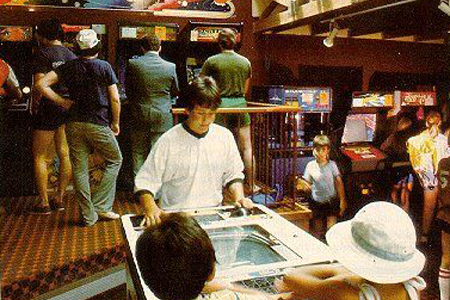William Gibson Says ‘Cyberspace’ Was Inspired By Old School Arcades.

I’m insane in my geeklust for William Gibson. Totally bananas. He is my God. Everyone knows by now that the dude created the term ‘cyberspace’ and that he imagined a distant future while writing Neuromancer on a friggin’ typewriter. Now we know where he got the inspiration for the word that’s come to worm itself into our Collective Unconscious. Arcades.
io9:
William Gibson has finally told the full story of how he invented the term cyberspace – partly by scribbling on notepads, and partly by watching kids playing videogames in early-1980s arcades.
Here’s a really fascinating excerpt from a much longer interview with Gibson:
INTERVIEWER
Where did cyberspace come from?
GIBSON
I was painfully aware that I lacked an arena for my science fiction. The spaceship had been where science fiction had happened for a very long time, even in the writing of much hipper practitioners like Samuel Delany. The spaceship didn’t work for me, viscerally. I know from some interviews of Ballard’s that it didn’t work for him either. His solution was to treat Earth as the alien planet and perhaps to treat one’s fellow humans as though they were aliens. But that didn’t work for me. I knew I wouldn’t be able to function in a purely Ballardian universe. So I needed something to replace outer space and the spaceship.
I was walking around Vancouver, aware of that need, and I remember walking past a video arcade, which was a new sort of business at that time, and seeing kids playing those old-fashioned console-style plywood video games. The games had a very primitive graphic representation of space and perspective. Some of them didn’t even have perspective but were yearning toward perspective and dimensionality. Even in this very primitive form, the kids who were playing them were so physically involved, it seemed to me that what they wanted was to be inside the games, within the notional space of the machine. The real world had disappeared for them-it had completely lost its importance. They were in that notional space, and the machine in front of them was the brave new world.
The only computers I’d ever seen in those days were things the size of the side of a barn. And then one day, I walked by a bus stop and there was an Apple poster. The poster was a photograph of a businessman’s jacketed, neatly cuffed arm holding a life-size representation of a real-life computer that was not much bigger than a laptop is today. Everyone is going to have one of these, I thought, and everyone is going to want to live inside them. And somehow I knew that the notional space behind all of the computer screens would be one single universe.
INTERVIEWER
And you knew at that point you had your arena?
GIBSON
I sensed that it would more than meet my requirements, and I knew that there were all sorts of things I could do there that I hadn’t even been able to imagine yet. But what was more important at that point in terms of my practical needs was to name it something cool, because it was never going to work unless it had a really good name. So the first thing I did was sit down with a yellow pad and a Sharpie and start scribbling-infospace, data space. I think I got cyberspace on the third try, and I thought, Oh, that’s a really weird word. I liked the way it felt in the mouth-I thought it sounded like it meant something while still being essentially hollow.
What I had was a sticky neologism and a very vague chain of associations between the bus-stop Apple IIc advertisement, the posture of the kids playing arcade games, and something I’d heard about from these hobbyist characters from Seattle called the Internet. It was more tedious and more technical than anything I’d ever heard anybody talk about. It made ham -radio sound really exciting. But I understood that, sometimes, you could send messages through it, like a telegraph. I also knew that it had begun as a project to explore how we might communicate during a really shit-hot nuclear war.
I took my neologism and that vague chain of associations to a piece of prose fiction just to see what they could do. But I didn’t have a concept of what it was to begin with. I still think the neologism and the vague general idea were the important things. I made up a whole bunch of things that happened in cyberspace, or what you could call cyberspace, and so I filled in my empty neologism. But because the world came along with its real cyberspace, very little of that stuff lasted. What lasted was the neologism.
Outstanding. I’ve recently been rereading Neuromancer, and the juxtaposition between cyberspace and arcades is made clear in the very beginning of the book. Gibson sends Case through a good amount of arcades and spends time comparing his former love’s face to the grids and blips of an arcade machine. Have to love the eerie reference to our transference to a culture obsessed with technology, and increasingly ingraining ourselves within it. Now we jerk off to impossible beauties on computer monitors, and spend time with technologies sprawling out of our hands and ears and pretty soon I’d imagine embedded directly in them.
Whatever.
Geekspanking, conclude!
You can read the entire interview in the summer issue of Paris Review online.



